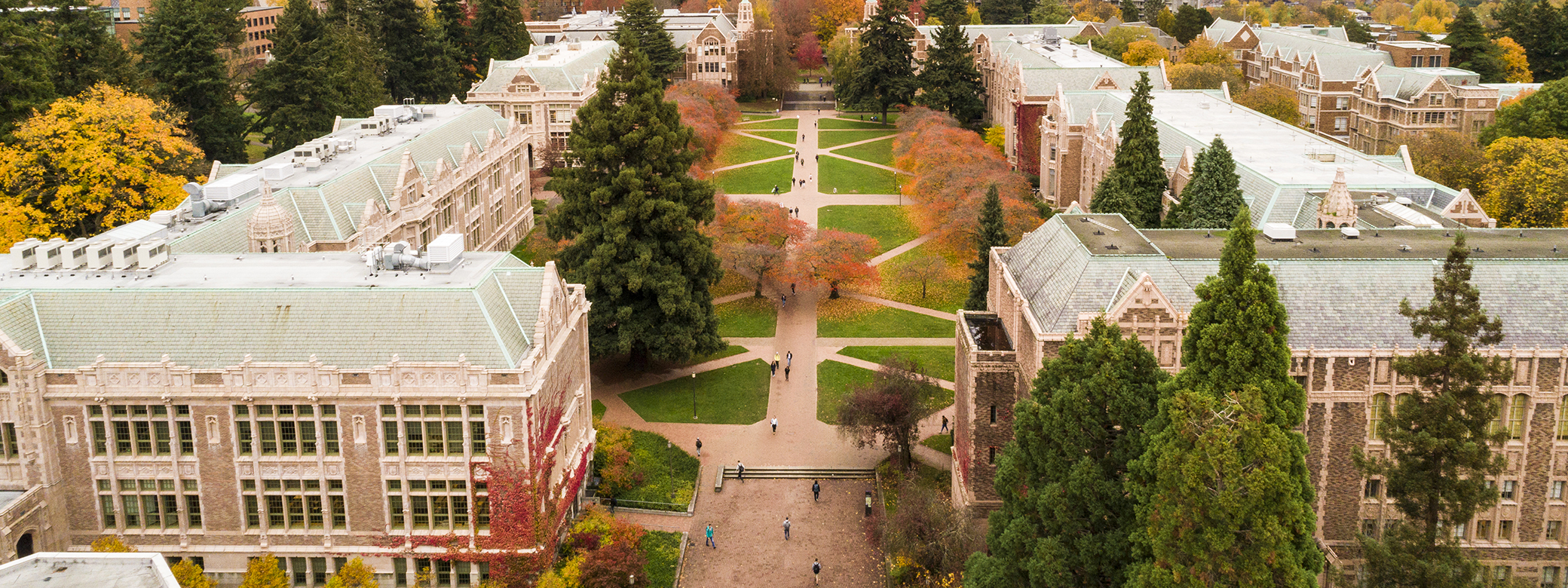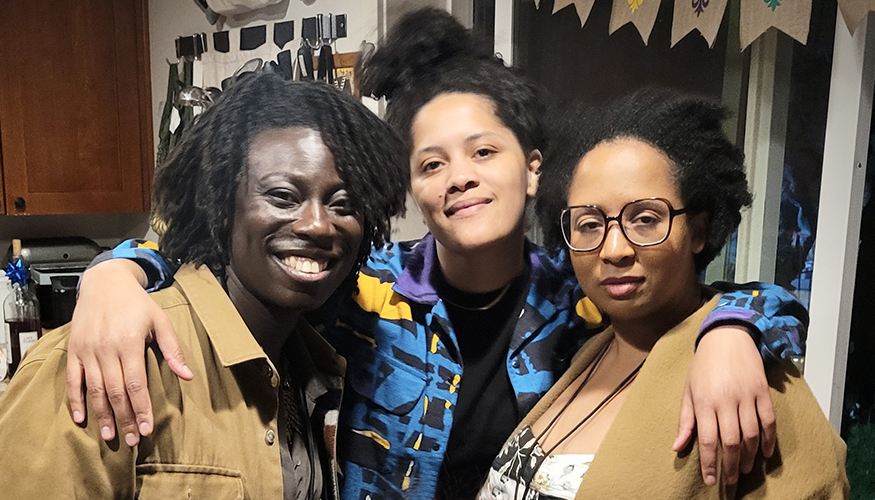
This is the third and final story in a series on Black artists and scholars.
This is a story about a rare occurrence of academic serendipity among friends who trained together in Chicago and are now pursuing scholarship in support of Black arts at the University of Washington. Kemi Adeyemi, Jasmine Mahmoud, and Nikki Yeboah, Performance Studies PhD graduates of Northwestern University (NU), reunited as faculty members at the UW, continuing years of community and collaboration.
Many in the Seattle arts and academic fields know Kemi Adeyemi as the director of Black Embodiments Studio, which is in residence at Jacob Lawrence Gallery. She is also an associate professor in the Department of Gender, Women & Sexuality Studies (GWSS). Jasmine Mahmoud, who recently joined the UW School of Drama (SoD) as an assistant professor after years at Seattle University, has worked across multiple institutions, sits on the boards of a number of arts organizations, and was appointed a Washington State Arts Commissioner by Governor Jay Inslee. She writes for regional publications and curates exhibitions in support of Black artists in Seattle. Playwright Nikki Yeboah, who joined the UW the same year as Mahmoud, is a SoD assistant professor and recently staged her play Akosua Goes Home (directed by colleague Valerie Curtis-Newton) at the Hue festival.
I had the opportunity to speak with Adeyemi, Mahmoud, and Yeboah about the distinct ways their backgrounds in Performance Studies are expressed through their work and how they cross disciplines, bridging their respective UW departments. This interview has been edited for length and ease of reading.
BSM: Was applying for faculty positions at the UW an alignment of fortuitous timing?
KA: I mean, nobody can plan placement like this — it's all serendipitous.
JJM: I was still at Northwestern, but I was already living in Seattle because of family. I remember getting a drink with Kemi and another mutual NU friend who moved here, and I was like ‘Oh my God, you might be in Seattle!’ That was probably 2015 or 2016.
KA : Yeah, 2015 because I started Fall of 2016.
NY: Seattle was never on my map of places. A couple of years ago I decided I wanted to transition from being a theoretical scholar to someone who makes creative work. When this opportunity came up, I felt like it was a long shot, but if I didn't apply, I’d be kicking myself. I really had no expectation that I would get this job, let alone in the same department as Jasmine, at the same institution with Kemi. It's surreal.
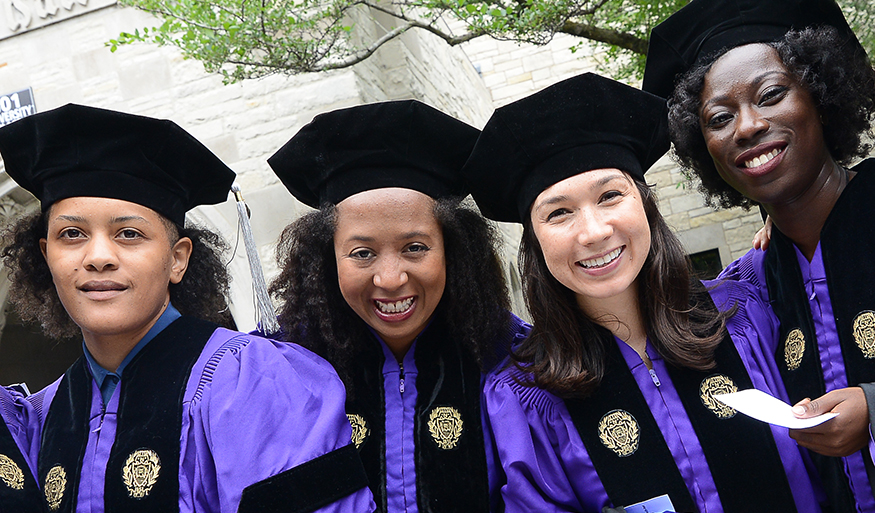
BSM: After graduating from the same Performance Studies program at Northwestern, you’ve each taken unique directions in your public scholarship. How do your pedagogy and creative engagements intersect with or depart from this discipline and performance culture in Seattle?
JJM: At NU, we were in a department with faculty of color who were doing multiple things in arts facilitation and public scholarship, which I feel planted that seed for us in grad school. We had models there like E. Patrick Johnson, who is foundational in Black Queer Studies, who started the Black Arts Initiative and curated Black performance and co-wrote a book with my advisor Ramón H. Rivera-Servera on solo Black women performers. Also Soyini Madison, who we all worked with, is an amazing ethnographer who not only wrote books but staged plays.
KA: I think all of us follow that model in our work. I don't think that teaching and scholarship and service have to be neatly interwoven. My classes serve the GWSS department and the students’ need of that content, but I can create a separation between the classes I teach and what I write. It’s too much emotional and intellectual work for it to be all connected, so I like the segmentation.
NY: I also look forward to teaching classes in the future where students partner with me on research, where they gain skills that may be lacking in [survey] classes — like going through a creative process from start to finish, which in my case is documentary theater work, beginning with research and ending in a performance.
BSM: Nikki would you say you landed into an established nest here?
NY: Finding community and friendships or having people to talk to about my research was an incredibly [difficult] uphill process and probably part of the reason I left [my previous university]. To be in an environment with people who share the same interests, the same history, is an incredible gift. I’ve heard that Seattle is a hard place to enter and that definitely has not been the case for me because I had them. They’ve established really good relationships in Seattle. They're loved and respected. When I show up and I say I’m friends with Kemi or Jasmine, people are automatically receptive to me which wouldn't be the case if they were different people.
BSM: It is hugely fortunate to have that, because it allows you to hit the ground running, to continue your work immediately, without having to deal with all sorts of social or psychological strife.
KA: We are not a cluster hire, but if [institutions] can help people establish an intellectual community and community-community, it’s huge! They’re not just colleagues but real friends, and we have others here who we know from Chicago, too. We have legitimate community which makes a world of difference in any environment that you're moving to, but especially a city like Seattle. I think the cluster hire model should be obvious as a necessary component to hiring and retention.
BSM: How does your history in Chicago or your original hometowns in California (Mahmoud), Minnesota (Adeyemi), or Toronto (Yeboah) figure into your work, if at all, in terms of relationships sustained there or those you've formed here?
KA: Before the pandemic I spent a lot of time not [being] here. When the city shut down, I was relieved because I was so exhausted from traveling. I calculated that I had traveled every three weeks for the first three years of living here. I’d travel to Minnesota and Chicago for friends and family and mental health trips. I’m curious what the years ahead will be like because I have real friends here. But theoretically and conceptually, when I sit down to write my book or do my work, I’m here, this is my frame of reference now.
JJM: I’m working on a book revision of my dissertation on experimental theatre and race in gentrification, which looks at New York, Chicago, and Seattle — because I’ve lived in all three cities — and it’s interesting that Seattle is not really covered in theatre scholarship. Though I think [Seattle] has faults in the theater scene, it’s really vibrant here, so I feel similar to Kemi in that I try to make sense of where I am, geographically and aesthetically.
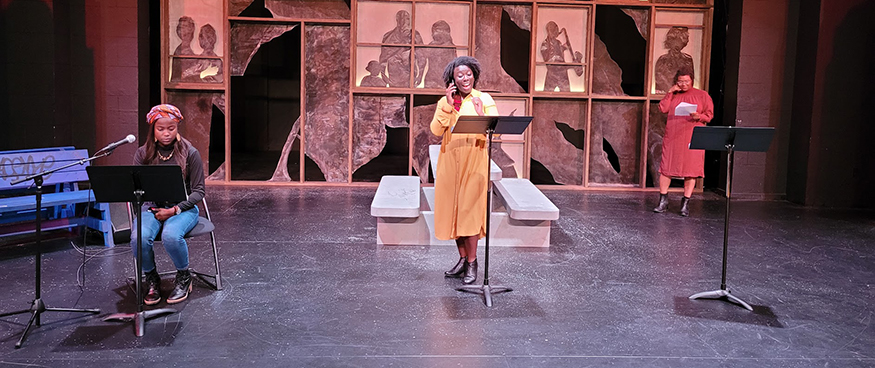
NY: Wherever I end up, I try to make sense of it through performance. Prior to working at San José State, I hadn't really imagined life in the US. I always thought I would go back to Canada.
In 2015, police violence was frequently headlined in the news, which was a real fear and concern for me, my family, and friends in Toronto. I chose San José State because California appeared to be one of the most liberal states in the US, but then I found out that someone was killed by campus police on our campus. So I created a play about police violence there.
Now that I’ve moved to Seattle, the [CHOP] protests are the big thing on my mind. Prior to coming here, it was all over the news. It felt like the city had a radical possibility and then I got here and it felt sanitized. It's actually surreal just how invisible that movement is today, so now I’m writing about that. [I tend to] orient myself to a city by doing some sort of creative work about it. I didn't realize that until now.
JJM: A unique thing in the first year of our PhD program (Nikki I’m thinking about your performances) was we all had to stage a 20-to-30-minute research-based performance, an exercise for us to work through questions, to think about performance as a site of knowledge — which influenced how we work because we were trained in how to stage performance and in ethnography.
KA: We did a lot of performance work in the classroom. It was a very hands-on program that really shaped us, with no separation between theory and practice. I think our UW departments hired us with full recognition that we would bring rigorous curricular options that wouldn’t just be an additive to existing protocols, but would specifically undermine different traditions in our departments; to program build. At least that was really clear when I was hired. I got the sense that was clear when you two were hired too.
JJM: I’m teaching Theatre History III now, which very easily can be a syllabus of dead white men, and I work very hard to change that. We read The Cherry Orchard by Chekhov, but we also read El Nogalar by Tanya Saracho (a Latinx adaptation of The Cherry Orchard). For final projects, I tell my students, ”You can plan a season of plays, you can dramaturg, you can stage a performance, you can design costumes, because these are all ways of showing your knowledge. You don't just have to write a paper.” I think about how to switch up survey courses so that people are learning by doing.
NY: In Performance Studies, we take apart to rebuild, and the taking apart can be difficult for a lot of students — to learn differently, to open themselves up to failure, to question things they’ve taken for granted.
BSM: Given your training and how disembodied we all are now, how did the pandemic shift your teaching methods, independent research, or creative projects in performance work?
KA: I got a lot of experience doing something I had never done before — lecturing. I’d never run a straightforward classroom with prepared lectures or an organized discussion with clear phases. It was hard to adjust to, and then I leaned into it and I’m taking a lot from that. So the disembodiment actually helped me think differently about teaching and how to make lecturing feel dynamic, so that I’m not just boring them!
NY: At San José State University, I focused my teaching on group work, which I had never done before. Students were so grateful because they were meeting outside of class. They felt like they hadn't even been this close to other students prior to the pandemic. So it's made me think consciously about how to build community within my classroom in a way that I hadn't really prioritized before.
JJM: I was at Seattle U, and all of you were guest speakers in my class there, and so I can add that the pandemic opened space for me to Zoom folks in who were not in Seattle.
BSM: Are you working on any collaborative projects in or outside of the academy?
JJM: Nikki and I co-teach a class, Performing Social Justice, that communicates to students about embodied knowledge for social change, and Kemi and I work on a project outside of UW that launched on June 1, Black Arts Legacies with Crosscut, which also expands on Kemi’s Black arts writing incubator with Black Embodiments Studio (BES). And I’ve just received a 2022 Collaborative Projects Grant from the Simpson Center which will fund a Research Cluster on Minoritarian Performance that will include Nikki and Kemi. I definitely think our work together can signal performance and minoritarian thinking as sites of knowledge — so our collaborative work is something I’d want the UW community to know of more explicitly, but this year has felt like such a marathon.
BSM: What impact do you hope to make in the UW community, in Seattle, or beyond?
JJM: One thing I care deeply about is people recognizing the value and importance of live performance as embodied presence, as needed in that it doesn't accumulate capital and resists circulating in a certain way. I want to show folks why we need live performance as a form that represents, that allows for dialogue, allows for imagination, allows for rehearsal.
KA: In my teaching I’m trying to help people ask more interesting questions to get to more interesting answers. That is the function of BES as well. Seattle has a really particular narration of what Blackness looks like here and what Black art looks like here, and it can repeat those narratives because of the ways that the city is paradoxically disconnected from the rest of the world. So something as simple as inviting Black artists to come here to give public talks might intervene on the kinds of questions people ask and the kinds of answers people arrive at. This is the best-case scenario of how I see my work creating an impact.
NY: I’m training makers and theorists. I want Seattle to be a place where people do interesting, thoughtful, critical work and not just art for art's sake. I want students to develop a creative language that looks back to their education at the UW as a place that inspired them to make great art. And so quite simply, that's what I’m in it for. Creativity isn’t limited by your location on a map; it’s limited by what you're exposed to, who you're exposed to, how you're taught to think and analyze and create, and so I just want to be a part of building that community for our students.
Berette S Macaulay is an interdisciplinary artist, independent curator, and writer based in Washington. She currently serves as Art Liaison Program Manager at Henry Art Gallery, the Curatorial Fellow at On the Boards, and founder and lead organizer for Black Cinema Collective, a project of i•ma•gine | e•volve.
Macaulay interviewed Adeyemi, Mahmoud, and Yeboah via Zoom for this series. Transcriptions are edited for clarity.
More Stories
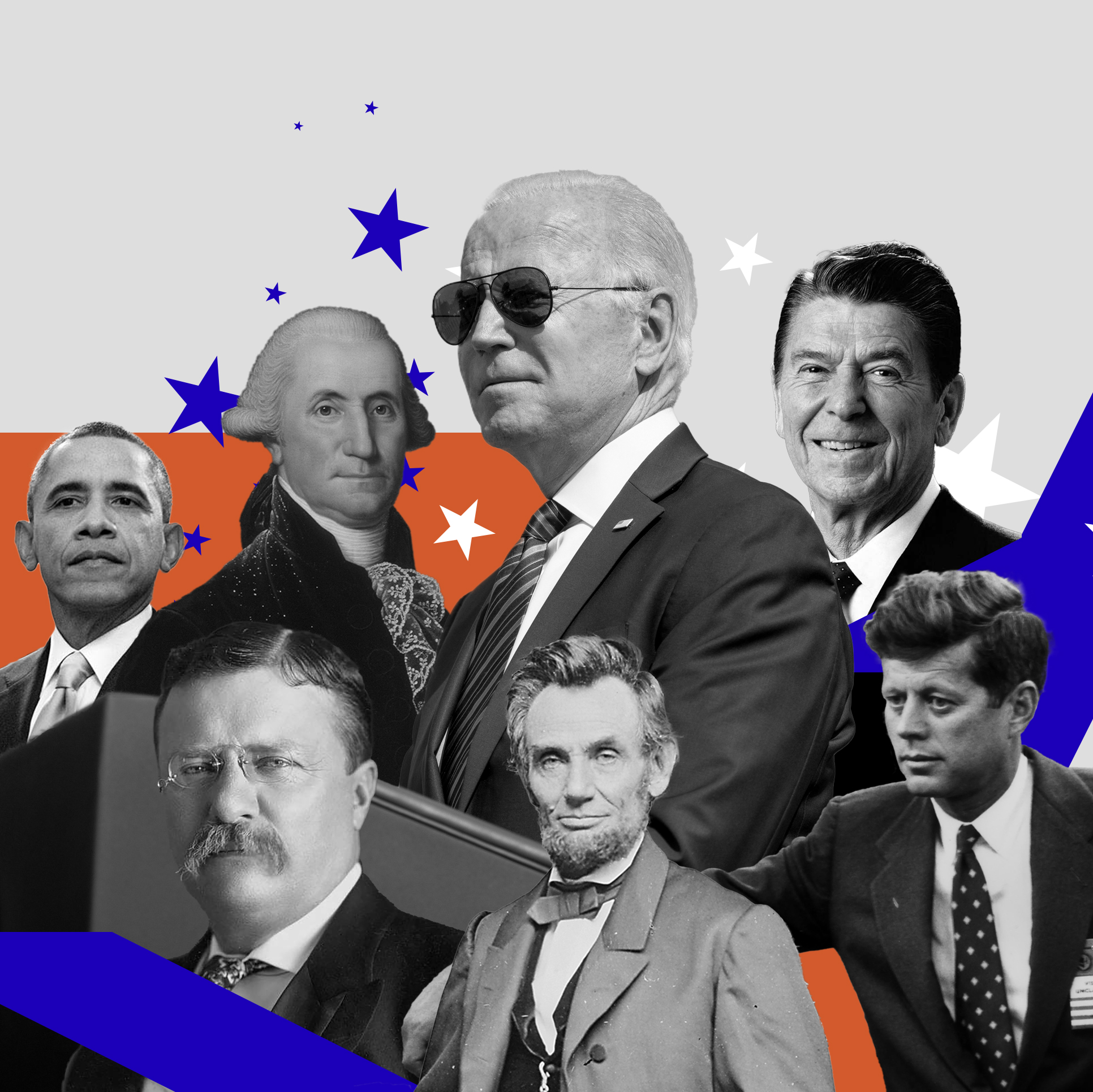
Is This Presidential Campaign Different?
UW History professor Margaret O'Mara provides historical context for this moment in US presidential politics.

Making Sense of This Political Moment
To navigate this momentous election season, Arts & Sciences faculty suggest 10 books about the US political landscape.
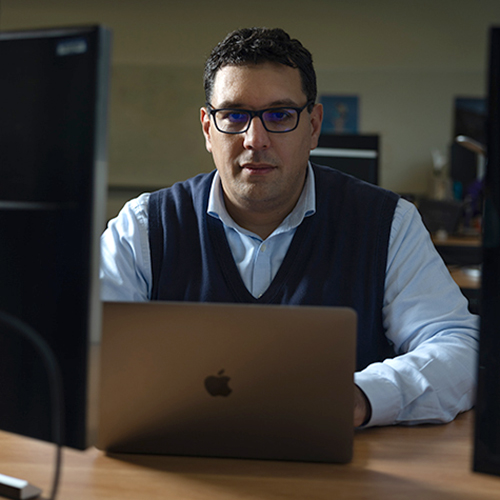
A Statistician Weighs in on AI
Statistics professor Zaid Harchaoui, working at the intersection of statistics and computing, explores what AI models do well, where they fall short, and why.
